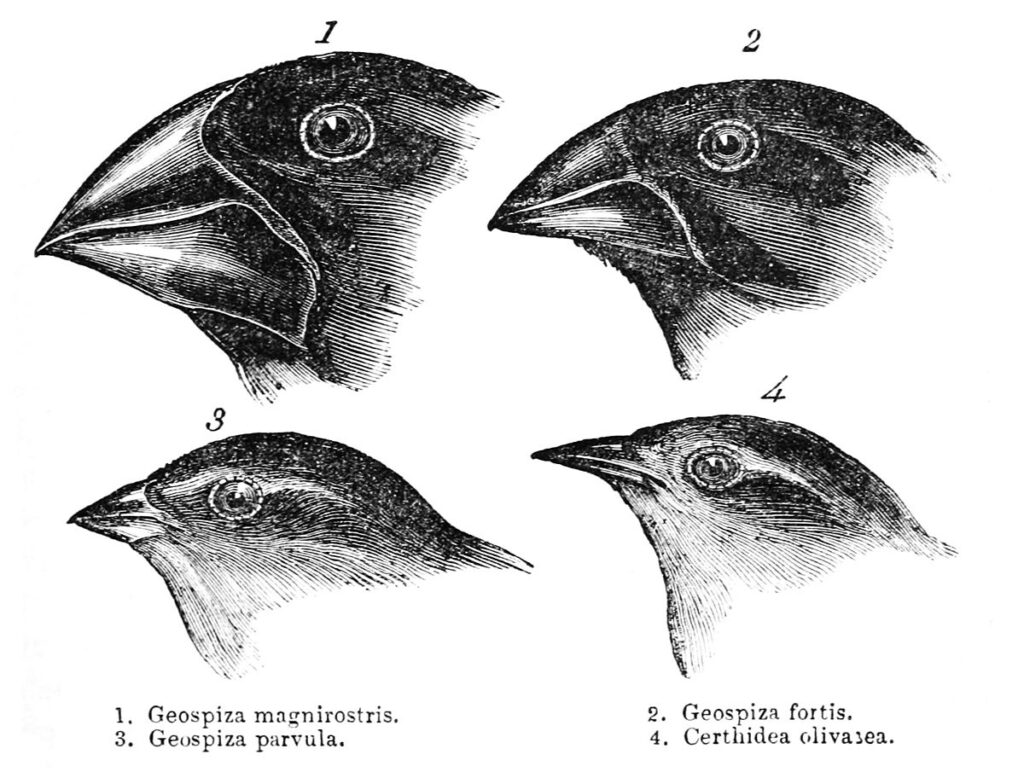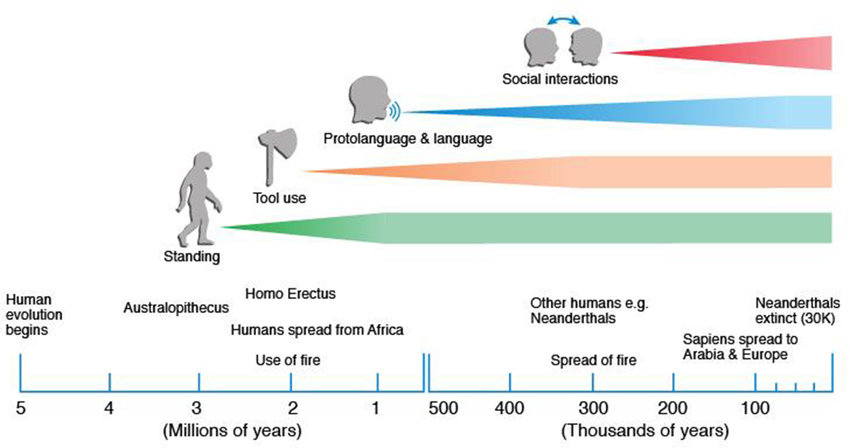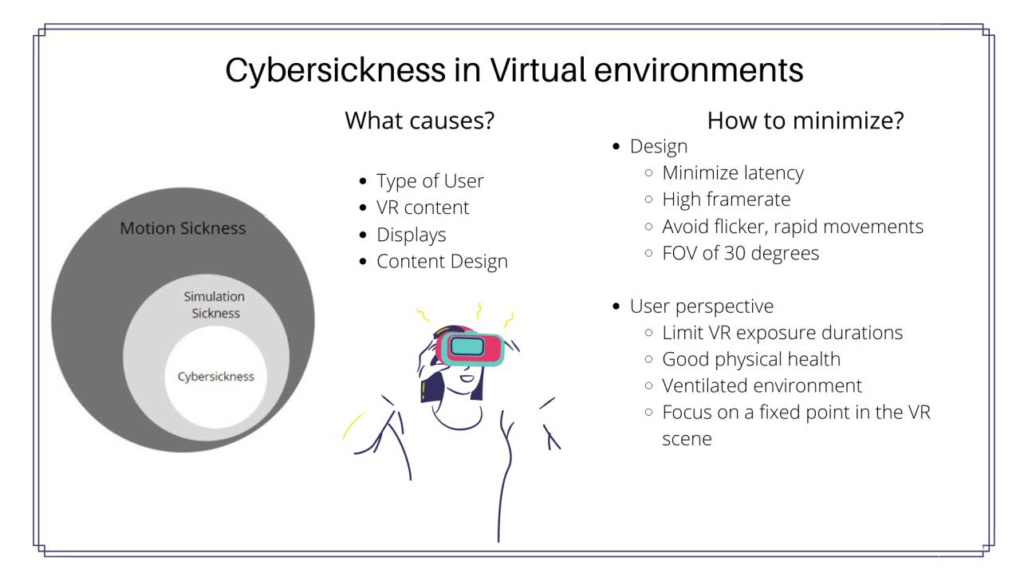Our ancestors as soon as huddled in small, remoted communities, their faces illuminated by flickering fires.
Proof of managed campfires for cooking and heat dates again some 700,000 years, however a whole lot of years earlier than then, homo erectus had begun to dwell in small social teams.
At this level, we are able to observe modifications within the vocal tract, which point out primitive types of communication.
That is when early people started to translate and share their inner states, primarily constructing a primitive worldview through which somebody and one thing existed past the self.
These early types of communication and social bonding caused a cascade of modifications that thrust human evolution ahead, culminating within the formation and dominance of recent people, homo sapiens.
Nonetheless, archaeological proof means that it wasn’t till the final 20,000 years or in order that people started to ‘calm down’ and interact in more and more complicated societal and cultural practices.
Little did early hominids know that the hearth round which they gathered was however a pale reflection of the hearth that burned inside them – the hearth of consciousness illuminating them on the trail to turning into human.
And little did they know that numerous generations later, their descendants would discover themselves gathered round a special sort of hearth – the intense, electrical glow of their screens.
The primal roots of human thought
To grasp the character of this primitive thoughts, we should look to the work of evolutionary psychologists and anthropologists who’ve sought to reconstruct the cognitive world of our distant ancestors.
One among trendy evolutionary psychology’s key insights is that the human thoughts just isn’t a clean slate however a set of specialised cognitive modules formed by pure choice to resolve particular adaptive issues.
This isn’t unique to people. Darwin’s early analysis noticed that the Galapagos finches, for instance, shared extremely specialised beaks that enabled them to occupy completely different ecological niches.
These diversified instruments correlated with numerous behaviors. One finch would possibly crack nuts with its massive, broad beak, whereas one other would possibly pry berries from a bush utilizing its razor-like invoice.

As psychologist Leda Cosmides and her colleagues, together with Steven Pinker, have argued in theories now summed as ‘evolutionary psychology,’ the mind’s modules as soon as operated largely independently of each other, every processing domain-specific data.
Within the context of primitive historical past, this modular structure would have been extremely adaptive.
In a world the place survival relied on shortly detecting and responding to threats and alternatives, a thoughts composed of domain-specific modules would have been extra environment friendly than a general-purpose mind.
Our distant ancestors inhabited this world. It was a world of speedy sensations, primarily unconnected by an overarching narrative or sense of self.
Nonetheless, over the course of hundreds of years, hominid brains grew to become extra broadly interconnected, enabling instrument use, protolanguage, language, and social interplay.

At the moment, we all know that completely different buildings inside the mind develop into closely built-in from start. fMRI research, equivalent to Raichle et al. (2001), present that data is frequently shared between varied components of the mind at relaxation.
Whereas we take this with no consideration and doubtless can’t think about anything, it wasn’t the case for our historical ancestors.
For instance, Holloway’s analysis (1996) on early hominid brains signifies modifications in mind structure over time supported enhanced integration. Stout and Chaminade (2007) explored how tool-making actions correlate with neural integration, suggesting that constructing instruments for various functions could have pushed the event of extra superior neural functionality.
The necessity for complicated communication and summary reasoning elevated as people progressed from small-scale teams the place people have been intimately acquainted with each other’s experiences to bigger teams that included individuals from diversified geographies, backgrounds, and appearances.
Language was maybe probably the most highly effective catalyst for humanity’s cognitive revolution. It created shared which means by encoding and transmitting complicated concepts and experiences throughout minds and generations.
Furthermore, it conferred a survival benefit. People who might effectively talk and work with others gained benefits.
And, gradually, people began to vocalize and talk simply because fairly than for any particular adaptive or survival worth.
Getting into the age of hyper-personalized realities
It took people thousands and thousands of years to maneuver from remoted teams to bigger, extra interconnected societies.
At the moment, we’d face a wierd inversion of this pattern — a return to extra individualized worlds mediated by AI and VR applied sciences.
In 2016, Mark Zuckerberg strode by an occasion as attendees donned the Meta 2 headset, the ensuing picture turning into an iconic forwarding of VR’s perils to isolate individuals of their private worlds.
is that this image an allegory of our future ? the individuals in a digital actuality with our leaders strolling by us. pic.twitter.com/ntTaTN3SdR
— Nicolas Debock (@ndebock) February 21, 2016
At the moment’s VR headsets, led by the Apple Imaginative and prescient Professional, can generate extremely lifelike and context-aware textual content, photographs, and 3D fashions for endlessly personalised immersive environments, characters, and narratives.
In parallel, latest breakthroughs in edge computing and on-device AI processing have enabled VR gadgets to run refined AI algorithms domestically with out counting on cloud-based servers.
This embeds real-time, low-latency AI functions into VR environments, equivalent to dynamic object recognition, gesture monitoring, and speech interfaces.
It’s now doable to create digital worlds not simply superficially tailor-made to our tastes however basically formed by our cognitive quirks and idiosyncrasies.
We develop into not simply content material shoppers however energetic members in our personal personal realities.
So what concerning the impacts? Is all of it only a novelty? Will the hype break as individuals develop bored of VR as they did a number of years in the past?
We don’t know but, however VR product gross sales are undoubtedly selecting up tempo. And whereas the Imaginative and prescient Professional has flaws and stays prohibitively costly – at a cool $3,499 – it will change.
Even so, asserting that everybody will dwell in VR inside 5, ten and even 25 years is senseless. VR has had loads of hype moments that dissolved away.
Meta is proof of that. In keeping with Bloomberg, they invested $50 billion into its Metaverse venture, which finally resulted in one in every of its greatest industrial failures.
Nonetheless, the Apple Imaginative and prescient Professional has the potential to succeed the place Meta fell brief. The Imaginative and prescient Professional’s superior expertise, intuitive controls, and seamless integration with Apple‘s ecosystem deal with many shortcomings that hindered Meta’s venture.
From the iPhone to the Apple Watch, Apple has persistently demonstrated its potential to create compelling merchandise that resonate with shoppers and compel broad adoption.
The timing of Apple‘s entry into the VR market is favorable. AI doesn’t simply help VR performance-wise; it additionally helps conjure a futuristic world the place VR actually belongs.
Recognizing individuals in public areas with headsets is turning into extra frequent, symbolising the expertise’s rising momentum.
VR’s affect on the mind
So, what concerning the impacts of VR? Is it only a visible tonic for the senses, or ought to we anticipate deeper impacts?
There’s loads of preliminary proof. For instance, a research by Madary and Metzinger (2016) argued that VR might result in a “lack of perspective,” probably affecting a person’s sense of self and decision-making processes.
A scientific overview by Spiegel (2018) examined VR use’s potential dangers and negative effects. The findings steered that extended publicity to VR environments might result in signs equivalent to eye pressure, complications, and nausea, collectively known as “cybersickness.”

Among the many stranger impacts of VR, a research by Yee and Bailenson (2007) explored the idea of the “Proteus Impact,” which refers back to the phenomenon the place a person’s conduct in a digital atmosphere is influenced by their avatar’s look.
The research discovered that members assigned taller avatars exhibited extra assured and assertive conduct in subsequent digital interactions, demonstrating the potential for VR to change conduct and self-perception.
We’re positive to see extra psychological and medical analysis on extended VR publicity now the Apple Imaginative and prescient Professional is out.
The constructive case for VR
Whereas it’s essential to acknowledge and deal with the dangers related to VR, it’s equally essential to acknowledge this expertise’s advantages and alternatives.
One of the promising functions of VR is in training. Immersive digital environments supply college students interactive studying experiences, permitting them to discover complicated ideas and phenomena in ways in which conventional educating strategies can’t replicate.
For instance, a research by Parong and Mayer (2018) discovered that college students who realized by a VR simulation exhibited higher retention and data switch than those that realized by a desktop simulation or slideshow. That could possibly be a lifeline for some with studying difficulties or sensory challenges.
VR additionally holds huge potential within the realm of healthcare, notably within the areas of remedy and rehabilitation.
For instance, a meta-analysis by Fodor et al. (2018) examined the effectiveness of VR interventions for varied psychological well being circumstances, together with nervousness issues, phobias, and post-traumatic stress dysfunction (PTSD).
One other intriguing research by Herrera et al. (2018) investigated the affect of a VR expertise designed to advertise empathy towards homeless people.
The Apple Imaginative and prescient Professional has already been used to host a personalizable interactive remedy bot named XAIA.
Lead researcher Brennan Spiegel, MD, MSHS, wrote of the remedy bot: “Within the Apple Imaginative and prescient Professional, we’re capable of leverage each pixel of that outstanding decision and the complete spectrum of vivid colours to craft a type of immersive remedy that’s participating and deeply private.”
Avoiding the dangers of over-immersion
At first look, the prospect of dwelling in a world of hyper-personalized digital realities could look like the final word success of a dream – an opportunity to lastly inhabit a universe that’s completely tailor-made to our personal particular person wants and wishes.
It may also be a world we are able to dwell in ceaselessly, saving and loading checkpoints as we roam digital environments perpetually.
Nonetheless, left unchecked, there’s one other aspect to this final type of autonomy.
The notion of “actuality” as a steady and goal floor of expertise is dependent upon a typical perceptual and conceptual framework—a set of shared assumptions, classes, and norms that permit us to speak and coordinate our actions with others.
If we develop into enveloped in our individualized digital worlds the place every particular person inhabits their very own bespoke actuality, this frequent floor would possibly develop into more and more fragmented.
When your digital world radically differs from mine, not simply in its floor particulars however in its deepest ontological and epistemological foundations, mutual understanding and collaboration threat fraying on the edges.
That oddly mirrors our distant ancestors’ remoted, individualized worlds.
As humanity spends extra time in remoted digital realities, our ideas, feelings, and behaviors could develop into extra attuned to their very own distinctive logic and construction.
So, how can we undertake some great benefits of next-gen VR with out shedding sight of our shared humanity?
Vigilance, consciousness, and respect might be vital. The longer term will see some who embrace dwelling in VR worlds, augmenting themselves with mind implants and cybernetics, and so forth. It can additionally see those that reject that favor a extra conventional life-style.
We should respect each views.
This implies being aware of the algorithms that mediate our interactions with the world and actively searching for experiences that problem our assumptions and biases.
Hopefully, preserving one foot outdoors of the digital world will develop into intuitive.

